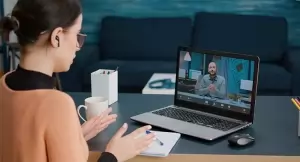Mastering Teacher job interviews via video apps
Video interviews through applications such as Skype, Zoom, Facetime and many others are hugely popular at the moment. The majority of schools still require vacancies to be filled when schools do finally reopen and not forgetting those recently graduated students looking to complete their NQT year from September. Whilst current social distancing restrictions are in place, telephone and interviews will remain in place. Because of this, it's now more important than ever to make sure that your telephone and video interview skills are up to scratch.
The thought of being invited to a video interview will either fill you with fear of the unknown, relief that you won’t have to leave the comfort of your house, or maybe even a bit of both. A video interview will have a large amount of similarities to a regular face-to-face interview, but here are some specific video interview tips to help you get through it.
1. Research the format
It is very important to know what format the video interview will take, as the two main types create a very different experiences.
Live - this is similar to a regular face-to-face interview. You'll speak to the interviewer (or panel of interviewers) in real-time over a video connection using a service such as Zoom, Skype or Google Hangouts. Live videos enable employers to recreate the traditional interview format without requiring the candidate to travel to their office, meaning they can recruit from anywhere in world. Try to treat the conversation as you would an interview at the school's offices and build a rapport with the interviewer.
Pre-recorded - this is a much less personal experience as you won't be speaking to a real person. You'll be presented with pre-recorded or even written questions on screen, and then you'll have to record your answer on video, often to a time limit. This helps employers who have lots of candidates, as they can simply watch your answers later at a time that suits them - but it can be awkward if you aren't used to recording yourself. The pre-recorded format can feel unnatural to some people, this makes practice even more important. On the plus side, you will be able to do the interview at a time of your choosing up to a set deadline.
2. Dress appropriately
For your video interview, you should dress professionally—the same way you would for an in-person interview. It is still a job interview and this is your opportunity to give a professional first impression - this means dressing appropriately. You should wear the same outfit you would have chosen for a face-to-face meeting with the employer. Think about how your clothes will look on screen and avoid bright colours, busy patterns and stripes and opt for softer colors instead. If you are wearing a tie, wear a solid color rather than a patterned one. If you wear glasses, adjust the lighting in the room to reduce glare from the lenses.
Position the camera so that you are looking up slightly and centered on the screen. While it’s likely that the interviewer will only see your upper half, it’s still a good idea to wear smart trousers or a skirt in case you need to stand up for any reason.
3. Choose your location
Plan well in advance where you're going to do the video interview. Use a quiet location, where you won't be disturbed by noises and people. Make sure the room you choose is tidy and use a clean and simple background so that the recruiter focuses on you. You need to think about the lighting as it won't be a great interview if you can't be properly seen. To ensure you don't get a shadow either use natural light from a window or put a lamp in front of the camera and adjust the distance to get the best result. Close any software on your computer that might play notification sounds, and switch your phone to silent to guarantee you won't be distracted. Also, let everyone in the house know you're about to start the interview so they don't interrupt.
4. Positive body language
Eye contact is very important during an in-person interview, and you want to convey that same level of connection during a video interview. Employers will be looking for you to make good eye contact, smile, listen and take an interest in what they're saying. To help you do this your camera should be at eye level and you should look into it rather than at the screen. When you’re listening, you can look back at the screen. Avoid slouching, moving too much or touching your face.
Throughout the interview, keep your mood upbeat and convey optimism with your body language. One way to achieve this is to have good posture. Sit in your chair with your back straight and your shoulders open. Feet can be planted on the floor and arms can rest in your lap or on the desk.
When you’re listening, nod and smile when appropriate to communicate that you’re giving them your full attention. Use hand gestures when it feels appropriate and keep your movements close to your body. Avoid fidgeting or letting your gaze drift away from the device.
For pre-recorded interviews, try to imagine you're speaking to a real person, maintaining your enthusiasm and positive body language. This can be harder to do when you're simply recording your answers.
If you're nervous it can be easy to rush what you're saying but remember that the employer wants to hear your answers. Speak clearly, and be careful not to interrupt as this is more easily done with the slight delay over the internet than during a face-to-face meeting.
5. Practice and tech set up
To get used to the technology and the body language of a video interview, it’s useful to do some practice video calls with friends or family members. Ask them to give you candid feedback about your appearance and eye contact. Run through it a few times until things start to feel natural. This practice can make all the difference in your interviews. Set aside time in your schedule in the weeks and days leading up to your interview—you’ll find your confidence growing as you become more comfortable in front of the camera.
On the day of your interview, review this checklist as you’re setting up:
- Ensure that you won’t be interrupted, either by locking the door or by alerting others that you can’t be disturbed (a note on the door of the room as well as the door to the outside may be helpful).
- Clear the desk space, except for a notepad and pen/pencil for you to take notes.
- Have a copy of your CV, the job description/advert and any other notes ready for you to reference.
- Set out a glass or bottle of water for yourself.
- Check that your webcam is working.
- Check that your audio is working.
- Close any windows, tabs or applications on your computer that you’re not using.
- Check your internet connection and make sure you’re not downloading anything in the background.
- Set your phone to silent.
- Check that the background behind you is neutral and free from clutter.
- Adjust the lights in the room. If things appear dark or dim, you may want to bring in an extra desk lamp to brighten the space.
If things go wrong
With technology, there’s always a chance things could go wrong. Here are some backup plans to have ready just in case.
If your video or audio stops working
Before the interview, ask the interviewer for a phone number where you can reach them if you experience technical difficulties. If the video cuts out, call them at that number. Ask if you can continue the interview by phone or if you can reschedule.
If noise interrupts the conversation
If noises (sirens, construction, etc.) interrupt your video interview, apologize for the interruption and ask for a few moments until the noise has subsided. You may want to mute the microphone if the noise is severe.
If someone enters the room unexpectedly
If family members, housemates or pets enter the room while you’re interviewing, apologize to the interviewer, ask for a few moments, mute your microphone and turn off your camera, and then step away to deal with the interruption. Make sure that the room is secure before beginning the interview again.
Follow up
As with any job interview, you should conclude by thanking the interviewer for their time. Send a follow-up thank you email later that day (or the next day if your interview was in the evening). This message may help build a stronger connection with your potential employer and help you progress to the next step.
Find out more...
Being accepted for a teaching job in London and the south east is a dream both recent graduates and teachers looking to return to the profession after a spell pursuing other interests share.
No matter what stage of your career you are at, in order to get your next job you are going to need to perform well in your interview.
Here is some interview advice you can be thinking about while you apply for teaching vacancies.
Have a positive mindset
Most people find the interview process to be a bit daunting. It helps if you can relax and focus on what it is designed to achieve as part of the school's recruitment process. Interviewers are not trying to trip you up and look for a reason not to employee you, just the opposite in fact. The interview is there to give you the best possible opportunity to go into more detail about the skills and experience you listed on your application. After all, if the school was not impressed by you, they would never have asked you to come to the next stage. Use the time to demonstrate all of your strengths and achievements, while mentioning other positive aspects such as ambitions.
The interview is also there for you as a candidate. Often it is the first chance you will get to see how you will fit in with heads and other teachers and see how this individual school will help you progress as a teacher.
Be prepared
Plan this interview like a lesson. Be totally familiar with the job description and know how your own experiences in teaching correlate with what the school is looking for. This is the minimum requirement, but to impress you need to research the school. Looking at the Ofsted site to see its latest reports and find out the school's CVA score is a good place to start, but also be aware of less quantifiable information such as the school's ethos or aims. Take time checking their website and get hold of a prospectus.
If part of the interview process involves you being given an invitation to visit the school, you must take it and make the most of the opportunity by talking to teachers and staff. This will not only help you get an idea of what the school is like, but will also inform your ideas about what sort of candidate the school is looking for.
A final matter you can keep abreast of before your interview is wider teaching issues, such as curriculum and policy changes. These could form the basis of some of the interviewers' questions.
Perfect your interview technique
If you are still on a teaching course, your tutor or mentor will be able to do mock interviews with you, but if you are looking to return to the teaching industry, you will not have this luxury.
There are plenty of ways you can improve on your own, however. List in easy-to-remember bullet points your strengths and how they relate to the role. Practice answers with these strengths in and focus on your delivery and body language. Remember, questions are likely to be open such as: What qualities do you a good teacher needs? What are your major strengths and weaknesses as a teacher? What are your career targets? You can ensure you are not stuck for words by knowing what you want to say beforehand.
Re-read your application form and see if there is anything you would like to clarify or elaborate on during the interview.
First impressions count
No matter how good your application is, you can spoil it in the first two minutes of an interview. Dress as smart as you can, get a good night's sleep and don't be late.
Preparing for a teaching interview
The fact that you have got through your teacher training course unscathed and are still enthusiastic about the teaching profession is a landmark event in itself. Now your focus shifts to doing applications, booking in some additional work experience if you have the time. It's all leading up to the inevitable – an interview.
Now, while you've certainly experienced your fair share of interviews over the years, this one is different. This is not just any job, a means to an end, something that pays the bills. No; this is a vocation, the start of a career in education, the very first real opportunity to actually get paid doing something you enjoy.
It goes without saying that while the process of being interviewed is never designed to catch you out, make you feel awkward and unnerve you; they can feel a little strange, irrespective of how confident you are. After all, here you are, suited and booted, sitting in front of a panel of strangers explaining how great you are. It is a little odd.
From the point of view of your prospective employer, interviews exist to determine your suitability for the role and whether you will complement the school's philosophy and approach to education.
As for you, from your perspective, it is about highlighting your strengths and experience (where relevant) and explaining clearly and confidently why you think you are a strong candidate and best suited for this particular school.
Prepare, prepare and prepare
Considering the fact that there are scores of individuals competing for the same jobs and all with similar qualifications – and indeed experience in some respects – you have to demonstrate during an interview what makes you not only stand out, but reveals that you are, by and large, ahead of your peers.
In short, do your homework and then do so more. Planning is vital in demonstrating why your employers should hire you. You'll want to show that you're well aware of the ins and outs of the school you are applying for (read their Ofsted reports, check out their website and look at their CVA score); familiarise yourself with the latest press releases from the Department of Education and acquaint yourself with current topics of debate.
Be yourself and make an impression
It may seem rather hackneyed, but first impressions really do count. Teaching isn't just about possessing knowledge and skills pertaining to your subject specialism. It is also about communication, building up a rapport, inspiring people and engaging with them in an effective way.
Your temperament and body language should make obvious these qualities. More often than not, interviewers are looking to see what you're like as a human being. Yes, it is an interview and you may be nervous, but sincerity of character will still shine through. Be polite and let conversations flow. Think of interviews as a discussion and you'll feel more comfortable.
Questions to prepare for
It is better to have a more meaningful, eloquent and effective answer prepared ahead of an interview than to fire off some answers that have come off the top of your head. You want to express authority, and this will come from a well-prepared answer.
Some questions to look out for:
- Why do you want to be a teacher?
- What qualities do you think a teacher should have?
- How do you think colleagues would describe you as a teacher?
- Give an example of how you would make a lesson diverse and inclusive?
- Describe your teaching style?
- What policy areas are you interested in?
- Do you have any weaknesses in your subject specialism?
- How do you plan and structure lessons?
- Outline how you would deal with a disruptive pupil/class?
- How would you contribute to the school as a whole?
Preparing for your first teaching interview
Does anyone actually enjoy being interviewed for a job they are keen on, you know, the kind of role that seems to make perfect sense personally and professionally, especially at the start of your career?
It's reasonable to assume that the answer to that question is a resolute no, the thought of it alone enough to make people feel ill at ease, as if they have just come down some illness.
Yet, c'est la vie, most of us will have to be interviewed for positions that are either functional – a part-time job that gets you by during college and university – or aspirational – a vocation that is more than just a livelihood.
Interviews are part and parcel of life, an event – for want of a better word – that is essential for helping employers and employees connect with one another in what is intended to be a near perfect fit. You win and they win.
If you have secured your first teaching interview, then you should be in a buoyant mood, confident in yourself because you've got momentum. The application process is, in itself, a very difficult part of the hiring process, so the fact that you have done enough to get noticed is laudable.
Now then, it's time to really impress. Our very specific guide offers you some tips about the kinds of questions you can expect when you're being interviewed for your first teaching role and the kinds of answers that will see you shine.
The usual interview dos and don'ts apply, but, in this instance, they don't really require any further explanation for this piece. Look smart, be polite and let you personality shine ... this job is yours for the taking.
Why do you want to be a teacher?
One of the classic questions that will, nine times out of ten, be asked at interview. Sincerity is paramount in your reply, as a stock response will be easily spotted by a seasoned headteacher.
Ultimately, what you want to get across is the fact that you enjoy a challenge, love working with young people, are enthusiastic about learning, passionate about education and want to dedicate your life to making a difference to other young people's lives.
Describe the kind of lessons you are keen on delivering?
This is one of those questions where your talents – supported by a quality mock lesson demonstration – get an opportunity to shine. Back up your suggestions – the more active, inclusive and differentiated, the better – with solid examples.
Other things to reference include how you'd get your pupils to be more reflective, what kinds of materials and tools you'd use and how you'd challenge and empower them.
How do you deal with challenging behaviour?
Heads are looking for you to show a shrewd, strategic and highly effective approach to resolving various incidents of challenging behaviour. It's one of those things that is unfortunately common in schools, so a sound awareness of the issues around various episodes and solutions is welcome.
If you have any examples of situations where you have successfully resolved a case of challenging behaviour, use it by way of support, otherwise go by best practice. This includes how to spot occurrences before they properly emerge, reinforcing the importance of good behaviour at all times and, when challenging behaviour is demonstrated, remaining in control and allowing pupils time to calm down.
What qualities should teachers have?
Think back to when you were a pupil and consider the qualities of the teachers you found to be inspiring. What was it about these individuals that made them stand out? Why were they so effective in making lessons fun and insightful?
Common qualities include possessing a personality, the kind that is approachable and authoritative (someone to talk to and someone you can respect); having a sense of humour; being fair; demonstrating a creative flair; and having the ability to make complex things easy to understand.










